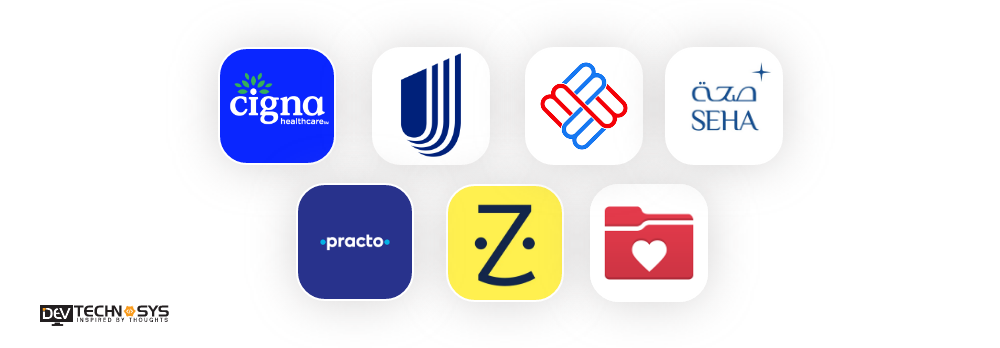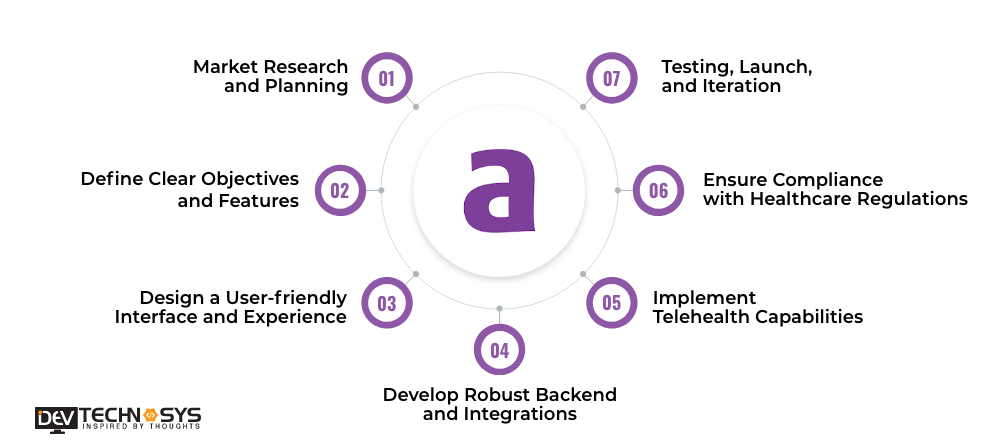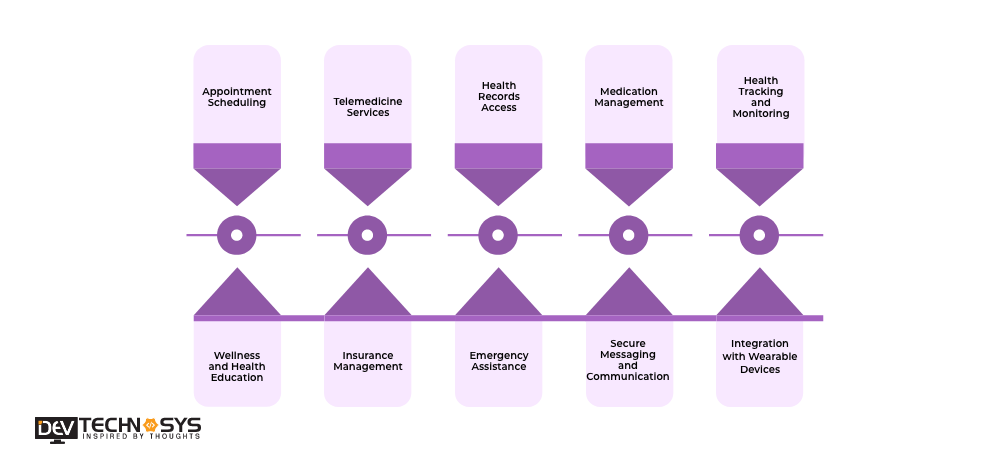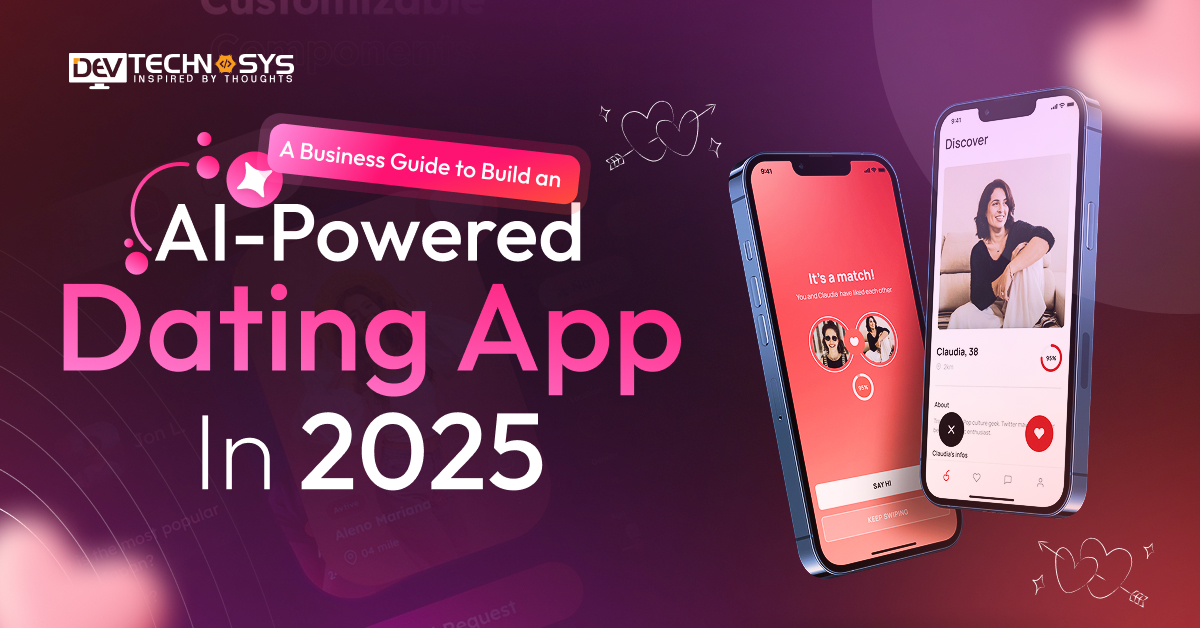Develop an App Like Aetna Health requires a sturdy platform with critical features for a smooth user experience. Set specific goals, such as user access to medical records, appointment scheduling, and health monitoring tools. Trust must be built via a user-friendly interface and safe data processing.
Enhance user engagement with tailored health data, telemedicine, and real-time notifications. Maintain HIPAA compliance to protect patient data. Develop appropriate medical content with healthcare providers to keep the app relevant. Continuous testing and user feedback loops improve app dependability and functionality.
In a competitive market like Aetna Health, scalability, and innovation will set your healthcare app apart.
Quick Summary: This blog will teach you how to develop an app like Aetna Health and other similar healthcare apps. It will also explore the healthcare software development stages and features of these apps.
What is an App Like Aetna Health?
To develop an app like Aetna Health provides a full range of healthcare services on mobile devices. It offers tailored health information, appointment scheduling, telemedicine consultations, and medical records. These apps prioritize user-friendliness, healthcare-compliant data security, and health-tracking device integration.
Medication reminders, wellness suggestions, and insurance management are often sent in real-time. Provider collaboration achieves correct medical data and timely updates. Such apps aim to improve user engagement, health outcomes, and 24/7 healthcare access.
Top 7 Healthcare Apps Like Aetna Health
These are the top seven health apps that function similarly to Aetna Health and provide a variety of features to enhance health management and access to medical resources. To create healthcare application Aetna health takes advantage of similar apps.

1. Cigna Health
Cigna Health provides resources for locating healthcare providers, tracking health benefits, and accessing private health records. Features including prescription management, wellness programs, and telemedicine consultations are included.
2. United Healthcare
The UnitedHealthcare app includes prescription management, health plan information, and virtual doctor visits via telemedicine. It also provides resources for determining the cost of medical care and locating local providers. It is the best app for healthcare in UAE, providing benefits to all users.
3. MediBuddy
MediBuddy offers a range of healthcare services, including online doctor consultations, health examinations, medication delivery, and medical record access. Its user-friendly design tries to make healthcare administration and access easier. It is one of the best online health management App like Aetna Health.
4. Practo
An app like Practo is a healthcare app that makes it easier to find physicians, diagnostic labs, and pharmacies. It lets users securely keep medical records, schedule appointments, order medications, and consult doctors online. In addition, Practo guarantees user privacy and data protection, maintains health profiles, and offers health advice.
5. Zocdoc
Users can locate and schedule appointments with physicians, dentists, and specialists using Zocdoc. In order to assist patients in selecting healthcare providers according to their requirements and preferences, it offers reviews and ratings.
6. MyChart
The patient portal app MyChart allows consumers to access the systems of their healthcare providers. Patients can use it to view their medical information, make appointments, ask for prescription refills, and securely contact medical professionals.
7. Seha
An app like Seha allows users to manage their health profiles, schedule doctor appointments, and access medical information. It is a full healthcare app that provides telemedicine consultations, health advice, and prescription reminders to ensure ease of use and efficient healthcare management.
5 Benefits For Businesses To Develop an app like Aetna Health
Creating an app similar to Aetna Health can benefit companies in various industries. So, if you want to invest in healthcare mobile apps, this is an ample opportunity for businesses to develop an app like Aetna Health. These are the following five main benefits:

1. Enhanced Customer Engagement and Loyalty
Creating a healthcare application similar to Aetna Health enables companies to interact with clients more successfully. Businesses can provide convenience and value-added services directly to their clients by offering features like appointment scheduling, telemedicine consultations, and health monitoring systems.
2. Opportunity to Expand Service Offerings
To build healthcare software like Aetna Health gives companies in the healthcare sector a chance to offer more services than they could through conventional means. By incorporating telehealth capabilities, users can consult medical specialists remotely, which is becoming increasingly popular due to its accessibility and simplicity
3. Data-Driven Insights and Analytics
With healthcare software development, you can gather a lot of information on user behavior, health trends, and preferences. By utilizing analytics to analyze this data, organizations can gain important insights into industry trends and client needs. These insights can inform strategic decisions on individualized healthcare offers, targeted marketing efforts, and service enhancements.
4. Cost Efficiency and Operational Streamlining
Creating healthcare software similar to Aetna Health can help organizations cut costs and streamline operations. By digitizing appointment scheduling, medical record management, and patient-provider communication, businesses can lower administrative costs and boost operational effectiveness.
5. Compliance and Security
Healthcare apps must follow strict laws like HIPAA (Health Insurance Portability and Accountability Act) to protect user privacy and security. Businesses must abide by these standards to develop apps similar to Aetna Health, which fosters consumer trust regarding data privacy and confidentiality.
7 Key Steps To Develop an App Like Aetna Health
Several crucial actions must be taken during the development of an app such as Aetna Health to guarantee its success and efficacy in providing healthcare services. Here are seven crucial actions you must consider to develop an app like Aetna Health :

1. Market Research and Planning
Start by performing in-depth market research to comprehend customer wants, rival products, and market trends in digital healthcare. Determine the target audience, gaps in the available healthcare services, and pain points that your app might address. Based on this study, plan your software’s features and functionalities to guarantee that it fulfills user expectations and stands out in the market.
2. Define Clear Objectives and Features
Establish specific goals for your app, such as wellness management, appointment scheduling, telemedicine consultations, and access to medical records. To develop an app like Aetna Health, give top priority to features that will meet the needs of your target market and set your app apart from rivals such as Aetna Health.
3. Design a User-friendly Interface and Experience
Hire dedicated developers to create user-friendly UX/UI designs that prioritize accessibility and usability. Create processes that allow consumers to easily make appointments, safely access medical records, and receive health alerts. Ensure that all devices and platforms are compatible to enhance accessibility for all users.
4. Develop Robust Backend and Integrations
Construct a scalable backend architecture that can manage user authentication, safe data storage, and connection with external services like payment gateways and the systems of healthcare providers—all while adhering to HIPAA regulations. Provide reliable APIs to enable smooth communication between the application’s various components.
5. Implement Telehealth Capabilities
Incorporate telehealth functionalities to provide remote patient consultations with medical experts. Confirm that the platform allows file exchange, encrypted messaging, and video conferencing for efficient virtual visits. Add functionality for online appointment booking, virtual examinations, and electronic prescription issuance.
6. Ensure Compliance with Healthcare Regulations
To build healthcaring App like Aetna Health, use security and privacy of patient data. To protect sensitive data, access controls, secure data transmission routes, and encryption technologies must be put in place. Conduct routine security audits to ensure your app conforms with all applicable healthcare standards and guidelines.
7. Testing, Launch, and Iteration
Throughout the development process, thoroughly test the application to find and address errors, guarantee usability, and confirm that it functions as intended. Conduct beta testing with a limited user base to collect input and improve features based on actual use.
Role Of Mobile Apps in The Healthcare Industry
If you want to know about the role of mobile apps in the healthcare industry, then here we provide some essential points to describe in detail:
- The mobile apps in the healthcare industry improve patient involvement, efficiency, and accessibility.
- Users can effortlessly manage their meds, make appointments, view medical data, receive telemedicine consultations, and monitor health metrics from their smartphones.
- Mobile apps enable individualized health interventions, remote patient monitoring, and health education, allowing people to take charge of their well-being.
Features Of Healthcare Apps Like Aetna Health
Aetna Health is one example of a healthcare app that often incorporates several features meant to improve overall health outcomes, ease healthcare management, and improve user experience. The following are essential characteristics of these apps:

1. Appointment Scheduling
It makes it easy for users to schedule appointments with medical professionals via the app.
It gives alternatives for choosing favored medical professionals, facilities, and appointment times depending on availability.
2. Telemedicine Services
Allows consumers to communicate securely through encrypted chat or video calls with medical professionals virtually. Eliminates the need for in-person visits by supporting remote diagnosis, treatment suggestions, and follow-up care.
3. Health Records Access
Enables safe access to individual health records, such as vaccination records, test results, medications, and medical history. Allows users to provide medical professionals access to their health information as needed.
4. Medication Management
It provides tools for tracking drug adherence, requesting refills, and setting medication reminders. It also provides details on possible adverse effects, dosing guidelines, and drug interactions. If you want to use this feature in your app, then contact a hybrid app development company.
5. Health Tracking and Monitoring
Contains features for monitoring blood pressure, blood sugar, and physical activity in addition to other vital indicators. Creates reports and trends over time to track the advancement of health and spot tendencies.
6. Wellness and Health Education
Provides articles, advice, and individualized health insights on wellness-related subjects based on user profiles and health objectives. Offers tools for managing chronic diseases, preventing disease, and leading a healthy lifestyle.
7. Insurance Management
It allows users to view and manage health insurance information, including coverage details, claims status, and deductible tracking. It also facilitates the electronic submission of insurance claims and reimbursements.
8. Emergency Assistance
It gives users access to medical alert data, emergency contacts, and location-based services in an emergency. It also provides information about the closest medical facilities and first aid protocols.
9. Secure Messaging and Communication
It allows secure contact between users and healthcare providers for follow-ups, consultations, and non-emergency questions and protects the privacy and confidentiality of private medical data.
10. Integration with Wearable Devices
Allows easy data syncing with wearable health devices, including glucose monitors, smartwatches, and activity trackers. Gives current information and analysis derived from data collected by wearable devices.
The Cost To Develop an App Like Aetna Health
The cost to develop a mobile app can vary greatly depending on several aspects, including the complexity of the features, the platform used for development, the size of the team, and the team’s location.
However, more sophisticated features like telemedicine, secure data handling (HIPAA compliance), and interaction with healthcare systems come at a price of up to $30,000 or more for more feature-rich, scalable apps. So, the healthcare software development cost is $8,000 to $30,000.
Cost To Develop an App Like Aetna Health
|
Healthcare App Development |
Estimated Cost | Time Frame |
| Simple App Development | $8000 – $15000 |
3 to 5 Months |
|
Medium-Complex App Development |
$15000 – $25000 | 5 to 8 Months |
| High-Complex App Development | $30000+ |
10+ Months |
So, the cost to maintain an app is 15% to 20% of the overall Aetna health mobile app development cost
Tech Stack To Develop An App Like Aetna Health
The following tech stack might be taken into consideration while creating a healthcare app similar to Aetna Health. The role of mobile apps in the healthcare industry provides efficiency for staff members and users.
- Frontend: React Native (for cross-platform development), Swift (iOS), Kotlin (Android)
- Backend: Node.js, Python (Django or Flask)
- Database: MongoDB, PostgreSQL
- Cloud Services: Amazon Web Services (AWS), Google Cloud Platform (GCP), Microsoft Azure
- Telemedicine: WebRTC for real-time video conferencing
- Security: SSL/TLS for data encryption, HIPAA-compliant practices
- Integration: FHIR (Fast Healthcare Interoperability Resources) for healthcare data interoperability
- Analytics: Elasticsearch, Kibana for data analysis and visualization
Monetization Techniques To Develop An App Like Aetna Health
Develop healthcare App like Aetna Health, but you don’t know how to generate new revenue streams. Here, we provide strategies that balance generating income and offering worthwhile healthcare services necessary to monetize an app like Aetna Health. These are some successful monetization strategies:

1. Subscription Model
Provide access to premium features including telemedicine consultations, individualized health insights, and improved health monitoring tools through subscription programs. To cater to varying user needs and budgets, offer tiered price options based on the degree of service and features included.
2. In-App Purchases
Provide in-app purchases for extra services or content, such as virtual healthcare packages, wellness courses, or premium health publications. Users may buy one-time services like online consultations or health evaluations through the app. With the help of an on-demand healthcare software development company, know more about this monetization technique.
3. Freemium Model
Offer a free rudimentary version of the app that has all the necessary functions, such as appointment booking and simple health monitoring. Provide a subscription-based premium edition with additional services including telemedicine, comprehensive health analytics, and customized health advice.
4. Referral Partnerships
Collaborate with pharmacies, wellness centers, or healthcare professionals to receive referral fees for each user that uses the app to make purchases or schedule appointments. Provide systems for affiliate marketing so that medical practitioners can recommend the app to their patients in exchange for a commission.
5. Advertising
Display adverts for pharmaceuticals, medical supplies, and other services that are pertinent to the healthcare industry within the app. Provide alternatives for tailored advertising depending on user demographics, health, or behavioral data, making sure that the adverts do not jeopardize the user experience and privacy.
Conclusion
When developing a healthcare app like Aetna Health, careful planning, strong technology integration, and compliance with healthcare standards such as HIPAA are necessary. Businesses may improve healthcare accessibility and user engagement by emphasizing user-centric features like telemedicine, appointment scheduling, and health record management. Maintaining the app’s relevance and efficacy in enhancing healthcare delivery requires ongoing iteration and user feedback. So, what are you waiting for? Share your project requirements with Dev Technosys, an Android application development services provider.
Frequently Asked Questions
1. What are the Essential Features to Include in the App?
Usually, this issue relates to essential features such as making appointments, using telemedicine, accessing medical records, and managing medications.
2. How Can the App Ensure Data Security And Comply With Healthcare Regulations?
Businesses typically worry about protecting health data. Answering this question requires strong security mechanisms, including encryption, authentication, and regulatory compliance.
3. What technology stack is suitable for Develop an app Like Aetna Health?
To develop a health management App Like Aetna Health, choose proper frontend development (React Native), backend infrastructure (Node.js, Python), database management (MongoDB, PostgreSQL), and healthcare interoperability standards like FHIR.
4. What are the Challenges in Integrating With Healthcare Providers and Insurance Systems?
Interoperability concerns and different data standards make integrating with healthcare providers and insurer networks difficult. API integration, data mapping, and compatibility with multiple healthcare IT systems are needed to answer this question.















